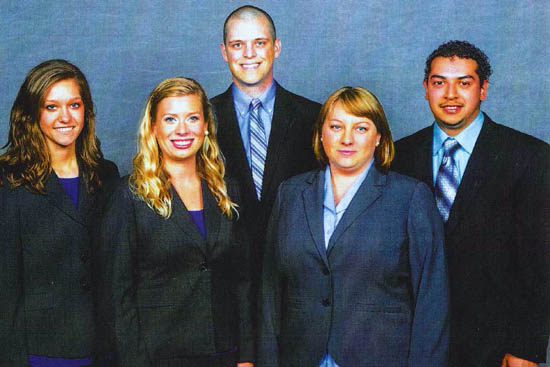Hold the textbooks; it’s a real-world education
Hold the textbooks; it’s a real-world education

They focused on reaching out to the young in Kentucky’s Promise Zone. They analyzed the market potential for a farm-to-office company in California and a new smartphone app for a large grain shipper, helped a credit company find ways to grow a successful lending program for beginning farmers and developed a marketing plan for a new locally-produced blueberry-oatmeal bar. That was just their homework.
Students plunged into the deep end of the business pool, working out solutions to real-world problems in Erica Flores’s agricultural products marketing and sales course, AEC 320, in the University of Kentucky College of Agriculture, Food and Environment. It’s not hypothetical work, either. The six clients who came onboard are real companies with real products and could very well benefit from the students’ research and creativity.
“It’s not the first time the course has been taught, but it’s the first time it’s been taught in this manner,” said Flores, academic coordinator for the UK Department of Agricultural Economics. “As academic coordinator for our department, I have responsibility for that experiential enrichment that we’ve adopted as a graduation requirement for our department…. I basically treated it (the course) as an internship.”
Clients included Consolidated Grain and Barge, which is owned by a Japanese conglomerate and employs more than 1,500 people at over 95 locations; Farm to Office, a community supported agriculture program in California that supplies organic fruits and nuts to offices; Farm Credit Mid-America, the UK Department of Agricultural Economics, who were looking for a way to promote their centennial celebration; the Kentucky American Private Enterprise System, which focuses on educating youth, and the Kentucky Blueberry Growers Association.
The students’ hard work was rewarded in many instances. Team members Daniel Buckingham, Malory Dalby, Kyle Kardak, Caleb Sadler, Jiayu Shaw and Shannon Smith developed ideas for a smartphone application for Consolidated Grain and Barge. They got to hear the magic words, “We have implemented your recommendations,” from the CGB panel.
“They were one client that was really engaged throughout the whole process,” Flores said. “They hosted the students up in Jeffersonville, Indiana. There were conference calls, and they worked with a number of people locally, regionally and at their corporate offices in New Orleans…. In the fall, they’re going to be a client again, through their fertilizer division.”
Work with the American Private Enterprise System led to one of that team’s members being hired as a Cooperative Extension intern for the summer. Kirby Whitaker, and fellow team members Nyema Cumberbatch, Erin DesNoyers, Jenna Klefot, Alexa Prettyman and Michael Schaeffer focused on rebranding and updating the existing system, as well as expanding awareness, in order to bring APES to high school juniors and seniors within the eight southeastern Kentucky counties named as a Promise Zone. Whitaker will be working to launch the program in his home county of Greenup.
A five-person team focused on creating a marketing plan for a new Kentucky Proud product called Blueberry Madness, a blueberry-oatmeal bar, spent a lot of time researching blueberry production in the state. The blueberry growers association had some, but not all of the information the team, which included Nathan Bush, Jessica Hagan, Alex Land, Jose Marin and Helen Sauer, needed to develop their plan.
“It took a lot of phone calls and a lot of Internet research and a lot of looking things up and crunching numbers ourselves, when we couldn’t exactly figure out yield per farm and average number of farmers,” said Sauer, now a graduate from agricultural economics. “The blueberry industry is in its infant stages in Kentucky, so there’s not a lot of information out there.”
Currently, the bar is distributed through schools in Metcalfe, Green and Russell counties. The team’s goal was to expand sales of the bar into the much larger Fayette and Jefferson counties school districts.
“Initially we were shooting for a 900 percent increase in the production of the bars over the next three years,” said Bush, who also graduated in May with an agricultural economics degree. “The growers association is going to have to work with us as far as increasing their production of raw blueberries, if we’re going to reach that goal of production.”
The Blueberry Madness team was able to take advantage of another opportunity. They were the first UKAg team to compete in Jacksonville, Florida, at the National Agri-Marketing Association’s competition against 29 other universities. NAMA serves the food and fiber industries and focuses on helping students develop professionally in agribusinesses.
Due to Flores, UK now hosts a chapter of the National Agri-Marketing Association for the first time.
“People coaching and departments competing (from other universities) have been doing this longer than I’ve been alive, and we’ve never had a chapter here, and we’ve never competed,” Flores said. “So that was a huge part. UK deserves to be in this arena.”
She said it was important to give the students exposure outside of the state.
“I wanted them to see professionals on a national scale,” she said.
Flores will be teaching AEC 320 again in fall 2014 and spring 2015.
Agricultural Economics Ag Equine Programs

